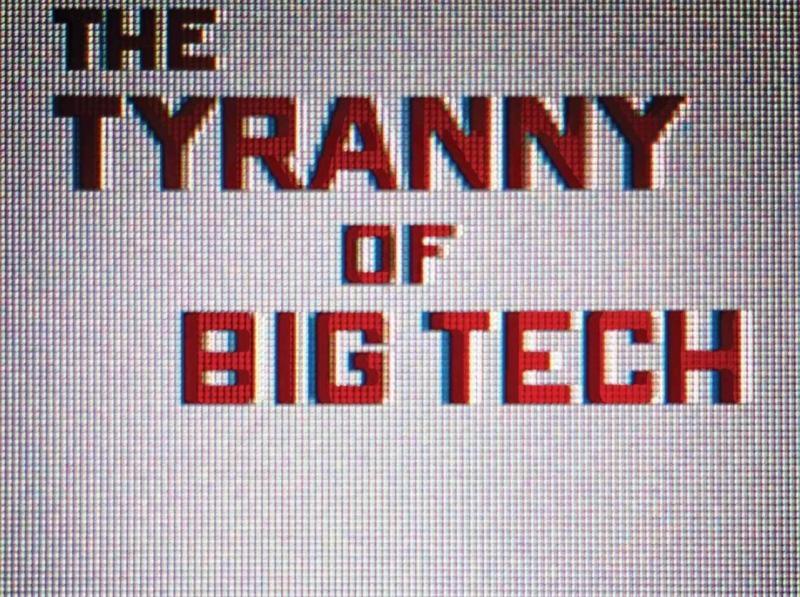In New Book, Josh Hawley Takes On The Tyranny Of Big Tech
By: FDRLST (The Federalist)



The American Dream is made possible through free enterprise, representative government, and individual liberty. That balance was upended when a handful of tech companies seduced the populace into giving up their right to privacy. Their schemes produced so much capital, Big Tech just bought off any resistance and repackaged these stooges as the #Resistance.
While we were distracted by buzzing smartphones, global corporations intruded into every aspect of our lives. As a result, Sen. Josh Hawley writes in his new book The Tyranny of Big Tech : “Our republic has never been more hierarchical, more riven by class, more managed by an elite than it is today. That is corporate liberalism’s legacy. But it need not be our future.”
The Tyranny of Big Tech unfolds in three parts. In the first, Hawley sketches a brief history of Gilded Age monopolies. In the second, he details the 21st century’s techno-capitalist takeover. I never thought I’d read a Republican author who’s grasped the work of tech-futurist Jaron Lanier, but Hawley’s full of surprises. The final section lays out the senator’s ambitious plan for antitrust legislation.
The Original Robber Barons
Hawley opens with the robber barons who consolidated railroad, steel, and oil monopolies at the turn of the 20th century. His story tracks two divergent philosophies: constitutional republicanism and corporate liberalism. The former is credited with defending the rights and dignity of the common men and women whose voices, he argues, the latter is crushing.
Hawley holds up Teddy Roosevelt as a defender of original republican values. He celebrates Roosevelt’s heroic efforts to loosen the robber barons’ stranglehold on America, even if that struggle failed to halt the wheels of “progress.”
He presents Woodrow Wilson as the face of corporate liberalism. First as a university professor, then as president, Wilson espoused a grand evolutionary vision of American society. Just as nature moves from simplicity to complexity, human society naturally progresses toward higher levels of cooperation. In this view, the international corporation emerges as the inevitable heir to earthly power.
Countering this arrogant elitism, Hawley advocates the original republican philosophy. His stated goal is to protect the ability of the working class to speak their minds and govern themselves.
Corporate liberalism, on the other hand, sold the public a new way of life based on personal choice. Ironically, corporations would leverage the fulfillment of individual desire to erode the common man’s right to self-government. Hawley points to Big Tech as the culmination of this process.
The Emerging Dystopia
The second part of Hawley’s book lays out our current problem. Through the miracle of digital technology, we have become app-dependent, easily manipulated, atomized, and mutually hostile. Our personal data is mined, and our souls sold back to us in digital form. As usual, our elected leaders have been too busy counting their campaign contributions to do much about it.
Without any meaningful consent, Google, Facebook, Amazon, Apple, and Twitter probe the inner lives of every person within reach, then sell that data to the highest bidder. You could argue that anyone who leaves his door unlocked deserves to get robbed, but only a shill would say the thieves should go unpunished.
Hawley does an excellent job of describing Big Tech’s mechanisms of surveillance and control. His chapter on the addictive nature of digital technology—perfected in the smartphone—shows how effortless it was to implement these systems. He compares app addiction to casino culture, with its clanging bells and unrealistic expectations. Each message alert, each “like” on social media, and each clickbait headline keeps the brain’s reward pathways locked in like a desiccated retiree glued to a slot machine.
For many, the results have been horrible. Hawley digs into the accumulating research on the parallel rise of digital culture and various psychological disorders. Citing social psychologists Jonathan Haidt and Jean Twenge, he highlights the correlation between unlimited screen time and the recent spikes in teen depression, anorexia, and suicide. While he’s careful to avoid definite causal relationships, he presents strong evidence that the dark side of digital tech outweighs its promise.
Hawley pulls no punches when discussing Big Tech’s effect on the broader social landscape, particularly in the realm of politics. He describes the conformist social networks that coalesce on Facebook and Twitter, and the blind hostility that erupts between them. Looking at the cold artificial intelligence that guides this process, Hawley wryly notes that “Empathy isn’t easy to code.”
He calls out the open censorship and intentional manipulation of search results—today’s dominant source of information—citing psychologist Robert Epstein’s conclusion that, “Google has likely been determining the outcomes of upwards of 25 percent of the national elections in the world since at least 2015.” That’s over and above the pipeline of cash flowing from Silicon Valley to Washington DC.
What is Big Tech’s endgame? Hawley writes:
The twenty-first century corporate elite hail global integration—social, political, and economic—as the great engine of progress. They prize transnational ties over any distinctly American identity. … Far from empowering ordinary people, Big Tech assaulted their agency and undermined their independence. By design.
The strangest part is that everyone knows this is true—the compulsion, the manipulation, the discord, the data extraction—but no one seems to care enough to stop it. A sense of inevitability has been cultivated around technology, which Hawley traces back to the evolutionary schema touted by the early progressives. He readily acknowledges there’s no going back, but against all odds, he’s committed himself to trying to steer this ship in a different direction.
Taking the Wheel Back from Big Tech
The book’s conclusion offers two parallel routes to a better society. The first is simple. In a high-tech marketplace, we’re forced to make healthy personal choices. Hawley urges his readers to cultivate rich communities in the real world, and holds parents responsible for shielding kids from the ubiquitous glowing eye.
The second solution is far more ambitious. At the forefront is Section 230 of the Communications Decency Act. This statute protects tech platforms from liability for users’ content, while still allowing them editorial control. It’s true that repealing the protection could have unintended negative consequences for smaller platforms, but so long as any tech company determines public discourse on such a large scale, there has to be accountability for silencing unwanted dissent.
Additionally, Hawley argues that Congress has to bust up the de facto monopolies held by Facebook, Twitter, Amazon, and Google. Each of these companies has cornered its respective markets—the public square, the marketplace, and information flow—plus a bevy of other fields, in addition to huge stakes in mass communication and artificial intelligence development. The original robber barons never enjoyed this level of concentrated global power. If the European Union has the guts to stand up to Big Tech, so should we.
Across the political spectrum, antitrust sentiments are converging with tech skepticism. Hawley’s book was published just a week after Sen. Amy Klobuchar’s Antitrust: Taking on Monopoly Power from the Gilded Age to the Digital Age . She focuses much of her attention on Big Pharma, which Hawley assailed as Missouri’s attorney general. The serendipity is astounding. But no significant legislation will be passed without bipartisan compromise and broad public support.
Purity spirals are for social media clubs. You wouldn’t find me singing in Hawley’s Presbyterian church, and he’d probably peg me for a granola-munching henotheist . So what? What’s important are our common interests.
True to form, dim liberals confuse such irony with hypocrisy. Since the book’s publication, haters have been typing out vapid headlines like “ Josh Hawley used lots of tech to hawk his book blasting big tech. ” What’s funny is that they’re only highlighting the problem. For all practical purposes, there’s no other way to reach the public en masse.
It’s like a man who takes a self-driving car to DC, where he protests a law that mandates autonomous vehicles. “Sir, how did you get here today?” asks the snarky congresswoman. The citizen shrugs and replies, “What choice did I have?”
Self-determination is impossible under a centralized system of control, whether it be corporate monopolies or communist rule. For a fleeting moment, the American public is being presented the opportunity to take the wheel. Can we cooperate long enough to correct the course?





Required reading. The big tech companies that do the bidding of the democratic party.
The book is
The Tyranny of Big Tech
White people are so oppressed.
White conservative people.
Any thoughts on freedom of speech?
We all have it. Most of the people who complain they are losing their "rights" have no good argument.
Is that your interpretation of what I say?
You don't see the social media giants restricting speech? Be prepared to defend it.
Freedom of speech applies to the government, not privately owned companies, like Google, Twitter, FB etc..
They are well within their rights to have their own rules, that when violated, can and will ban or suspend an account.
I know, we hear it ad nauseum, however there is no question that those big companies are doing the bidding of the democrats. (In other words, the left has gotten around the Constitution via these media giants)
They are well within their rights to have their own rules, that when violated, can and will ban or suspend an account.
And We the People are within our rights to remove the special status that congress once granted them. That is why the above mentioned Senator Josh Hawley is taking Silicon Valley to task with new legislation to hold social media platforms like Facebook, Google, and Twitter accountable for their political bias by stripping them of existing Section 230 protections. We can expect to see that Bill move forward in 2022, when Republicans regain congressional control.
Sour grapes.
Ah, so he is trying to force people to have a certain political bias now? How very fascist of him.
You are NOT within your rights to force anyone to believe a certain way or have a political bias that is only an approved political bias. There was a leader in the past that tried to do exactly that....what was his name again? Oh yea, Adolf Hitler.
BTW?
What you are proposing is 100% socialism.
Again, freedom of speech is in reference to the US Government, not privately owned companies. Hawley is a far right wing fascist that is very pro-hate crime. If you want to hitch your horse to a proud racist that wants more hate crimes. You feel free to do so and scream it loud from the rooftops because.....freedom of speech. Right?
And projection on your part.
Hey, you said it, not me.
I mean, that's what YOU said.
Vic, we all know why the right is so hyperventilated over "freedom of speech". That want the freedom of hate speech.
The rest of the world doesnt care if Facebook censors inflammatory posts.
Even if that was true - ALL SPEECH NEEDS TO BE PROTECTED. So, let me ask you if hate speech needs to be censored, why hasn't Twitter shut down Maxine Waters or Jim Carrey?
The rest of the world doesnt care if Facebook censors inflammatory posts.
The rest of the world meaning the radical left?
Xx seeded an article already about Hawley's book :
Your article is redundant.
Nice try, but no, his piece was an opinion piece from Newsmax, while mine is a book review.
So ... once again another take:
Josh Hawley’s Virtual Reality
So he basically was lying...
Of course. Hawley is a far right wing radical. You expected he would tell the truth? LOL
I think he got lost in the process of either wrapping a lie with layers of truth or wrapping a truth with layers of lies. Hawley probably feels he needs to stay a hobbled step ahead of Cruz.
Reads like the morons that thought rock music was from the devil and made kids evil...
I guess Hawley is too weak to not use big tech. He's just another weak sheep/leader.